(英语)英语特殊句式专项
必备英语中考英语 特殊句式(较难)
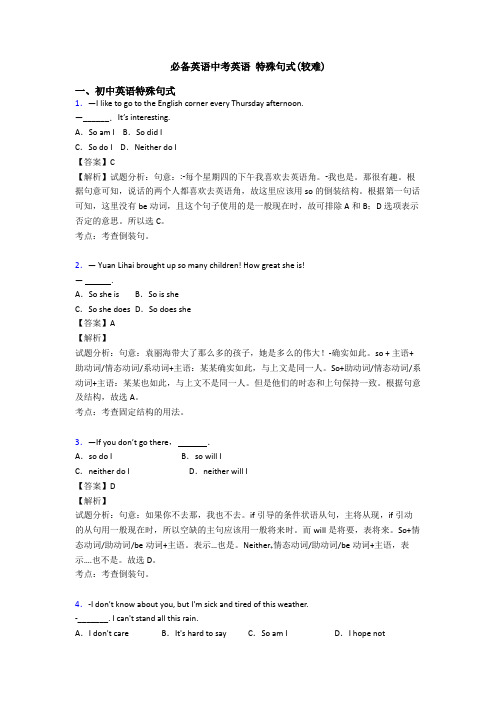
必备英语中考英语特殊句式(较难)一、初中英语特殊句式1.—I like to go to the English corner every Thursday afternoon.—______.It’s interesting.A.So am I B.So did IC.So do I D.Neither do I【答案】C【解析】试题分析:句意::-每个星期四的下午我喜欢去英语角。
-我也是。
那很有趣。
根据句意可知,说话的两个人都喜欢去英语角,故这里应该用so的倒装结构。
根据第一句话可知,这里没有be动词,且这个句子使用的是一般现在时,故可排除A和B;D选项表示否定的意思。
所以选C。
考点:考查倒装句。
2.— Yuan Lihai brought up so many children! How great she is!—.A.So she is B.So is sheC.So she does D.So does she【答案】A【解析】试题分析:句意:袁丽海带大了那么多的孩子,她是多么的伟大!-确实如此。
so + 主语+助动词/情态动词/系动词+主语:某某确实如此,与上文是同一人。
So+助动词/情态动词/系动词+主语:某某也如此,与上文不是同一人。
但是他们的时态和上句保持一致。
根据句意及结构,故选A。
考点:考查固定结构的用法。
3.—If you don’t go there,.A.so do I B.so will IC.neither do I D.neither will I【答案】D【解析】试题分析:句意:如果你不去那,我也不去。
if引导的条件状语从句,主将从现,if引动的从句用一般现在时,所以空缺的主句应该用一般将来时。
而will是将要,表将来。
So+情态动词/助动词/be动词+主语。
表示…也是。
Neither+情态动词/助动词/be动词+主语,表示….也不是。
故选D。
考点:考查倒装句。
英语特殊句式试题

英语特殊句式试题1.—I began to learn English when I was a little child.—Wow. You must have studied English for many years, ?A.don’t you B.mustn’t you C.needn’t you D.haven’t you【答案】D【解析】句意:—我儿时就开始学英语。
—哇哦,你一定学习英语多年了,是吗?很明显这是一个反意问句,前面的陈述句部分用must have done是对过去的推测,反意问句要看时间,如果陈述句有具体的过去时间,就用一般过去式,如果陈述句部分没有具体的过去时间,就用现在完成时,这里的for many years是和现在有关的时间,用现在完成时,选D。
【考点】考查反意问句2.(2012江苏卷)The notice came around two in the afternoon the meeting would be postponed.A.when B.that C.whether D.how【答案】B【解析】句意为:会议将被延期的通知大约下午两点钟来。
空格后的句子是解释说明名词the notice,作同位语从句,在从句中不做任何成分,所以用that引导。
【考点】名词性从句-同位语从句3.(2012福建卷)We promise attends the party a chance to have a photo taken with the movie star.A.who B.whom C.whoever D.whomever【答案】C【解析】首先本句考查的关键短语是promise sb sth“向某人承诺某事“本句指的是向参加聚会的人提供一个和电影明星合影的机会,不定式做chance的定语,然后就是参加聚会的任何人whoever="anyone" who,这样句子就很清晰了,所以划分句子成分非常关键,以前考察whoever 都是做状语,而本题考查的是作promise的宾语,挺新颖的。
英语特殊句型

以前我从未看过这么感人的电影。 Not a single mistake did he make.=He didn't make a single mistake. 他一个错误也没犯。
专项语法十五 特殊句式
要点精析
一、倒装
1.完全倒装
谓语动词完全搬到主语之前的句子,便 是完全倒装句。这类句型主要有两种:
(1)表示方式或方位的副词或介词短语, 如here, there, now, then, up, down, in, away, off, out, in the room, on the wall等, 置于句首时。
只有以这种方法,我们才能学好英语。
Only when he returned did we find out the truth.
注意:only修饰主语时,句子不可倒装。
Only you can solve the problem.
只有你能解决这个问题。
(2)否定副词never, nor, not, hardly, little, seldom, scarcely, rarely及表否定意义的介 词短语at no time, under/in no circumstances, in no case, by no means, on no condition等置于句首时。
So dark was it that he couldn't see the faces of his companions.
天这么黑,他看不见同伴的脸。
特殊句式(较难)

特殊句式(较难)一、初中英语特殊句式1.— I visited the Purple Mountain Observatory last Sunday.—Why didn’t you tell me earlier?A.You did? B.I hope so.C.Have a good time. D.It’s kind of you.【答案】A【解析】试题分析:句意:—上星期天我参观了紫金山天文台。
—是吗?(你去了吗?)为什么不早点告诉我?A. You did?你去了?; B. I hope so.我希望如此; C. Have a good time! 玩高兴点;D. It’s so kind of you.你真好心,根据句意及语境应选A。
考点:考查情景交际2.—I have seen the film Where Are We Going, Dad?— ______. I think it’s wonderful.A.Neither have I B.So have IC.Neither I have D.So I have【答案】B【解析】试题分析:句意:--我已经看过电影《爸爸,去哪儿?》—我也是。
我认为它是精彩的。
分析:前句为陈述句意用so, so +助动词+主语(表示……也是), so+主语+助动词(表示的确是); 前句为否定句用neither. Neither+主语+助动词(表示……也是),neither +助动词+主语(表示的确是)。
通过答语体现为我也是,并且前句为肯定句。
故选B考点:考查倒装句的用法。
3.---Who is the boy ________ is playing football over there?---The one over there? It’s Jim.A. who B. that C. which D. whom【答案】B【解析】试题分析:句意:-在那里踢足球的男孩是谁?-那边的那个吗?是吉姆。
(英语)初中英语特殊句式常见题型及答题技巧及练习题(含答案)含解析

(英语)初中英语特殊句式常见题型及答题技巧及练习题(含答案)含解析一、初中英语特殊句式1.—Where's your brother?—Oh, he ________ the library and ________.A.has been to; so Lucy is B.has gone to; so Lucy hasC.has gone to; so has Lucy D.has been in; so has Lucy【答案】C【解析】句意:---你哥哥在哪里?-----哦,他去图书馆了,露西也去了。
1.have been to sp.表示去过某地,主语在说话人的地方,指从某个地方回来了,通常可与表示次数的状语连用; have gone to sp.表示到某地去了,没有回来,强调说话的当时去某地的人不在场,可能在去某个地方的路上,在去的那个地方,或回来的路上;have been in sp.意思是一直呆在某个地方。
根据上文“Where's your brother?(你哥哥在哪里?)”结合语境可知“去图书馆”没有回来了,可知用has gone to sp.;2.so + be动词/助动词/情态动词+另一主语,此句型中需将主谓语倒装,表示前句所述的肯定情况也适用于另外一个人或物,例如,He is an English teacher. So am I. 他是英语教师.我也是英语教师。
so+主语+be动词/助动词/情态动词,此句型的主语与前一句的主语通常是指同一个“人或“物,.主谓语不需要倒装,这种句型表示说话者赞同前句所提到的情况或事实,例如,----He will go to England for his holiday tomorrow.他明天要去英国度假. ----So he will. 的确如此。
本句意思是露西也已经去了,故用So has Lucy;选C。
2.-I don't know about you, but I'm sick and tired of this weather.-_______. I can't stand all this rain.A.I don't care B.It's hard to say C.So am I D.I hope not【答案】C【解析】试题分析:A. I don't care 我不在乎 B. It's hard to say很难说 C. So am I 我也是 D. I hope not我希望不要这样;句意:我不知道你的情况,但是我生病了,讨厌这种天气。
英语特殊句式试题类型及其解题技巧含解析
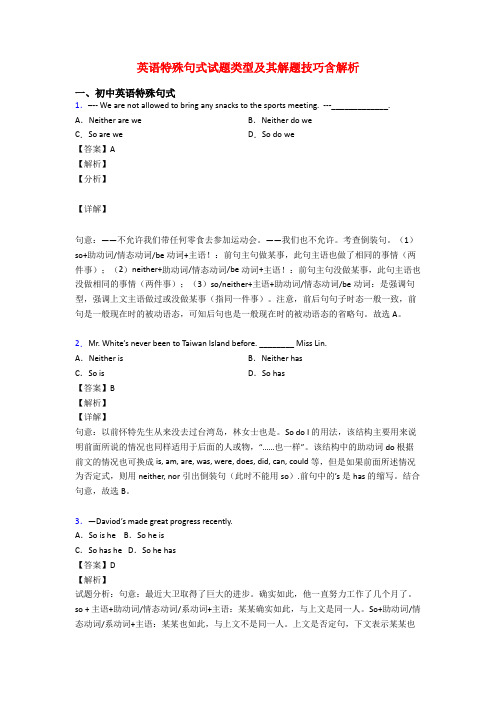
英语特殊句式试题类型及其解题技巧含解析一、初中英语特殊句式1.–-- We are not allowed to bring any snacks to the sports meeting. ---_____________. A.Neither are we B.Neither do weC.So are we D.So do we【答案】A【解析】【分析】【详解】句意:——不允许我们带任何零食去参加运动会。
——我们也不允许。
考查倒装句。
(1)so+助动词/情态动词/be动词+主语!:前句主句做某事,此句主语也做了相同的事情(两件事);(2)neither+助动词/情态动词/be动词+主语!:前句主句没做某事,此句主语也没做相同的事情(两件事);(3)so/neither+主语+助动词/情态动词/be动词:是强调句型,强调上文主语做过或没做某事(指同一件事)。
注意,前后句句子时态一般一致,前句是一般现在时的被动语态,可知后句也是一般现在时的被动语态的省略句。
故选A。
2.Mr. White’s never been to Taiwan Island before. ________ Miss Lin.A.Neither is B.Neither hasC.So is D.So has【答案】B【解析】【详解】句意:以前怀特先生从来没去过台湾岛,林女士也是。
So do I的用法,该结构主要用来说明前面所说的情况也同样适用于后面的人或物,“……也一样”。
该结构中的助动词do 根据前文的情况也可换成is, am, are, was, were, does, did, can, could 等,但是如果前面所述情况为否定式,则用neither, nor引出倒装句(此时不能用so).前句中的’s是has的缩写。
结合句意,故选B。
3.—Daviod’s made great progress recently.A.So is he B.So he isC.So has he D.So he has【答案】D【解析】试题分析:句意:最近大卫取得了巨大的进步。
英语特殊句式及句型题练习及答案

英语特殊句式及句型100题练习及答案1.— Have you known each other for long2.— Not very long; ____ we started to work in the company.3.A. after B. before C. when D. since4.2. — Did you enjoy yourself at the party5.—Sorry to say I didn’t. It was ____ a meeting than a party.6.A. much of B. more like C. less of D. more or less7.3. He is rather difficult to make friends with; but his friendship;____; is more true than any other.8.A. once gained B. when to gain9.C. after is gained D. while gaining10.4. The river; ____ are covered with trees; is very long.11.A. which banks B. of which banks12.C. whose the banks D. the banks of which13.5. ____ it will do us harm or good remains to be seen.14.A. If B. Whether C. That D. Where15.6. We should do more such exercises in the future; I think; ____we did yesterday.16.A. as B. which C. that D. than17.7. I am so glad that I have found the same modern computer ____I am working on.18.A. which B. as C. that D. where19.8. ____ method you choose; so long as you finish the job on time.20.A. It isn’t a matter to me what B. What doesn’t matter is that21.C. It doesn’t matter to me which D. No matter which22.9. It was quite a serious mistake; ____caused by carelessness.23.A. which I think was B. I think which was24.C. which I think it was D. I think which it was25.10. The young man went into the cinema and after ____ seemed halfan hour he came out.26.A. that B. it C. what D. which27.11. One of the men held the view ____ the book said was right.28.A. what that B. what C. that D. that what29.12. Soon they got to the bank. ____stood a big pine tree.30.A. In front of which B. There C. Where D. It31.13. He was impolite to the Custom Officer; ____; of course; madethings even worse.32.A. who B. that C. what D. which33.14. After living with his grandparents in the countryside forten years; the boy returned to the big city ____ his parents worked.34.A. which B. where C. that D. when35.15. ____ much advice I gave him; he did exactly what he wantedto.36.A. How B. Whatever C. No matter D.However37.16. It is not I but Mr. Green who ____ in charge of the company.38.A. is B. am C. are D. was39.17. The students are talking about the strange people and stories____ they met in the adventure.40.A. that B. which C. what D. whom41.18. The first thing ____ you should do is to learn all the newwords by heart.42.A. what B. that C. which D. who43.19. Is this the very factory ____ he visited last month44.A. which B. that C. where D. in which45.20. He went home for lunch ____ the clock struck twelve.46.A. while B. immediately C. right away D. at once47.21. — ____ makes her different from the other students48.— Honesty; I think.49.A. How is it that B. How is that C. What is it that D. What itis that50.22. She won’t leave the TV set; ____ her husband is waiting forhis supper.51.A. as though B. even though C. whether D. whenever52.23. It is the teacher ____ taught me when I was a child ____ Iam going to visit.53.A. that; which B. who; which C. who; that D. whom; that54.24. It was in the school ____ he had studied ____ he began theimportant experiment.55.A. that; where B. in which; which56.C. where; that D. where; in which57.25. ____ on Monday night that all this happened58.A. Is it B. It is C. Was it D. It was59.26. Is there anything else ____ you want to get ready for theparty this evening60.A. which B. that C. who D. what61.27. I ____ see him yesterday.62.A. really B. do C. did D. does63.28. ____ come again.64.A. Do B. Can C. May D. Did65.29. ____ be careful when crossing the street66.A. Must B. Should C. Ought to D. Do67.30. It was ____ the old worker came that we ____ the experiment.68.A. until; didn’t begin B. not until; began69.C. u ntil; began D. not until; didn’t begin70.31. It is I ____ singing in the garden.71.A. who are B. who is C. that am D. that is72.32. Hardly ____ into the country ____ it began to rain.73.A. we had got; when B. we got; than74.C. had we got; when D. did we get; than75.33. Not a single word ____ last night.76.A. he said B. said he C. did he say D. had he said77.34. Little ____ about what others think.78.A. he cares B. he doesn’t care C. does he care D. doesn’t hecare79.35. Seldom ____ any mistakes during my past few years of workingthere.80.A. would I make B. have I made C. I did make D. shall I make81.36. He is a good student; and works very hard; ____.82.A. so it is with her B. so does she C. so is she D. neither doesshe83.37. Only when it is hungry ____ attack a human being.84.A. a lion will B. did a lion C. will a lion D. do a lion85.38. Look ____.86.A. Here your teacher comes B. Comes here your teacher87.C. Your teacher come here D. Here comes your teacher88.39. No sooner ____ to shine ____ it clouded over again.89.A. the sun had started; than B. had the sun started; than90.C. the sun started; when D. did the sun started; when91.40. So loudly ____ that even people in the next room could hearhim.92.A. did he speak B. spoke he C. he spoke D. should he speak93.41. Not only ____ the book; but also he remembered what he hadread.94.A. he had read B. had he read C. he did read D. did he read95.42. ____ ; they continued the work.96.A. As it was late B. It was late as C. It was as late D. Lateas it was97.43. ____ the bus until it has stopped.98.A. Not get off B. Don’t get off C. Didn’t get off D. Get notoff99.44. ____ are the days when teachers were looked down upon. 100. A. Gone B. Go C. To go D. Going101.45. ____ rich and strong102. A. Our country may become B. May our country become103. C. Our country becomes D. Does our country become104.46. In the open boat; the four men; ____ was a doctor; met with a storm at sea.105. A. one of which B. one of who C. one of whom D. one of them 106.47. This is an illness that can result in total blindness ____ left untreated.107. A. after B. if C. since D. unless108.48. Let me introduce myself to you all; ____109. A. may you B. will you C. won’t I D. won’t you110.49. The unsold goods he brought home are useless to me; ____ 111. A. aren’t they B. are they C. did he D. didn’t he112.50. Nobody has the right to go there to have dinner free;____A. hasn’t itB. has itC. haven’t theyD. have they51. I don’t believe everything goes well with you; ____A. do theyB. does itC. don’t theyD. doesn’t it52. Mr Wang must go to Beijing to visit Mrs Brown today; ____ heA. mustn’tB. may notC. can’tD. needn’t53. Jack said Betty had always been interested in geography; ____A. hadn’t BettyB. hadn’t sheC. didn’t JackD. didn’t he54. What you told me is really true; ____A. isn’t itB. isn’t whatC. didn’t youD. wasn’t it55. I w on’t let you in ____ you show me the written permission of the manager.A. apart fromB. unlessC. exceptD. but56. Everyone wants to have a holiday; but you have no idea ____ tiresome it is to rest.A. howB. whatC. whetherD. no matter how57. I felt somewhat sad and was about to leave ____ somethinghappened which drew my attention. A. unless B. until C. when D. while58. I decided to pay a visit to my former teacher as soon as I ____.A. finish what I didB. finished what I didC. would finish what I was doingD. finished what I was doing59. We see the lightning ____ it happens; but we hear the thunder later.A. the momentB. for the momentC. at the momentD. in a moment60. ____ that I’m feeling all right; my brain is also beginning to work much better.A. ForB. NowC. SinceD. Despite61. These two countries are similar ____ they both have a high snowfall during winter.A. to thatB. besides thatC. in thatD. except that62. My cousin keeps the photo ____ he can see it every day; as it always reminds him of his college days in Florida.A. whichB. whereC. whetherD. when63. You can arrive in Guangzhou on time for the fashion show ____ you don’t mind taking the night train. A. provided B. unless C. though D. until64. Most people usually have less money at the end of the month than ____at the beginning.A. which isB. which wasC. they haveD. it is65. Doctors have said that as many as 50 percent of patients don’t take medicine ____ directed.A. likeB. soC. whichD.as66. Mr Smith was so angry at all ____ Bill was doing ____ he walked out angrily.A. that; whatB. that; thatC. which; whichD. what; that67. Girl ____; she is much naughtier than a boy.A. although she wasB. though she isC. though was sheD. although was she68. The girl got herself into a serious situation ____ she was likely to lose control over the motorbike. A. where B. which C. while D. why69. I think you ought to end it ____ it is too late; or you’ll kill yourself.A. even ifB. beforeC. so thatD. once70. They were surprised that a four-year-old boy should work out such a difficult problem ____ they themselves couldn’t. A. onceB. thenC. whileD. if71. I was advised to arrange for insurance ____ I needed medical treatment.A. neverthelessB. althoughC. in caseD. so that72. I haven’t found my watch yet; in fact; I’m not sure ____ I could have done with it.A. whereB. whetherC. whatD. how73. —____ in this street —I think Mr. Black is the richest man.A. Whom do you think is the richest manB. Who do you think is the richest manC. Do you think who is the richest manD. Do you think whom is the richest man74. ____ puzzled the mother most was ____the son would never agree with her.A. What; whyB. That; howC. Which; whenD. What; where75. ____ computers are of great benefit to the development of science and technology.A. The fact is whatB. That the fact isC. What the fact is thatD. The fact is that76. Word has come ____ some excellent students will go on a study trip to Chicago next month.A. thatB. whatC. whenD. whether77. The players expected there ____ more free time before coming back to the country from abroad. A. is B. being C. have been D. to be78. It is well known to us all ____ China sent up a manned spaceshipto outer space successfully last year. A. that B. what C. which D. when79. ____ he was fired by the company is ____ he didn’t work hard.A. What; becauseB. Why; becauseC. Why; thatD. That; because80. The man who was being followed stopped from time to time ____ he wanted to tie his shoelaces. A. as if B. like C. what D. as 81. Living things are dying out quickly. Let’s ask ____ destroying them in the past years.A. what part people have been playingB. people have played inC. what part people have played inD. people have been playing what part82.The teacher found ____ difficult to decide ____ he would take with him to attend the conference. A. it; whom B. himself; who C. this; whom D. that; who83. No matter how fast we worked; ____.A. we couldn’t catch up with themB. and we couldn’t catch up with themC. so we couldn’t catch up with themD. but we couldn’t catch up with them84. The reason why I gave in is ____ if I didn’t.A. because she would be disappointedB. that she would be disappointedC. because she would have a disappointmentD. for she would be disappointed85. — ____ can I deal with such a situation— Take ____ measure you think best.A. How; whicheverB. What; whateverC. How; whateverD. What; whichever86. Villagers often say our village is no longer ____ it used to be.A. whatB. thatC. whichD. how87. This is certainly the case; but ____ it is a mistake or not I don’t know.A. ifB. even thoughC. whetherD. that88. The workers were making so much noise in the workshop; and the boss hurriedly went to see ____.A. what the matter wasB. what was the wrongC. what wrong wasD. what was the matter89. I remember ____ the company only owned a small shop.A. whenB. howC. whetherD. what90. The changes in our chemistry lab will cost quite a lot; ____ they will save us money in the long run. A. or B. since C. for D. but91. ____ has finished the task ahead of time will be rewarded; though we don’t know who it will be. A. Those who B. Anyone C. WhoeverD. Who92. He expressed his hope ____ he would visit China again the next year; and this was the very hope ____ he expressed as soon as he arrived in the country.A. that; thatB. which; whichC. that; whichD. which; that93. I often think of the years ____ I worked with the foreigners; ____ has had a great effect on my later life. A. that; which B. when; which C. which; that D. when; who94. In the forest we observed some trees ____the leaves were black with disease.A. whereB. of whichC. in whichD. whose95. I don’t believe the reason ____ he has given for not coming to the lecture.A. whyB. thatC. howD. what96. By using ears one can tell the direction ____ a sound comes.A. in whichB. from whichC. with whichD. through which97. I don’t like such a person ____ often lies before your face.A. whatB. thatC. asD. which98. We have to delay the party till next week; ____ we will not have something important to do.A. whenB. whichC. at which D that99. Every day the mother seems to be busy until 10 o’clock at night; ____the rest of the family have fallen asleep.A. thatB. by which timeC. on timeD. whose time100. He was found to be a thief; ____ disappointed his wife.A. whoB. thatC. which Dwhom答案及部分解析:1.D.. other very long. We have known each other since we started to work in thecompany.2.B..题意为“与其说是晚会;倒不如说是个会议”..more ...than意为“与其说……倒不如说……”..3.A..once gained是状语从句的省略; 相当于once it is gained..4.D..5.B..6.A..7.B.. 8.C.. matter作动词时; 意为“要紧;有关系”; 常用于否定或疑问句中.. 9.A..which引导非限制性定语从句; I think是插入语..10.C..what 引导名词性从句作介词after的宾语..11.D..that引导同位语从句;what the book said是同位语从句中的主语..12.B..13.D..which引导非限制性定语从句;指代主句的整个情况..14.B..15.D.. 16.A.. 17.A.. 18.B.. 19.B..20.B.. 21.C.. 22.B.. 23.C.. 24.C.. 25.C.. 26.B.. 27.C.. 28.A..为了加强祈使句的语气;在动词前加do;表示恳求..29.D.. 30.B.. 31.C..32.C..33.C.. 34.C..35.B..36.A.. 37.C.. 38.D.. 39. B..40.A..so...that...句型中;so+形容词/副词位于句首时;主句中的主谓语要部分倒装..41.B..not only...but also连接两个并列分句;且not only位于句首时;其引起的分句中主谓要部分倒装..42.D..as引导让步状语从句;意为“尽管;虽然”;从句常用倒装语序..这种倒装是把作表语的名词或形容词、作状语的副词much及动词原形提到句首..如果表语部分是名词;提前时通常将冠词去掉..如:Althoughhe is a child;he knows a lot.可改写为Child as he is;he knows a lot.注意:如名词前有形容词修饰时;冠词常保留如:A little child as he is;he knows a lot...43.B..这也是—个not... until句型;主句为祈使句..44.A..表语位于句首且主语较长或结构较复杂的句子;主谓通常全部倒装..题意为“教师被瞧不起的日子一去不复返了..”45.B..表示祝愿的句子常用倒装形式..又如:Long live the great unity of the peoples of theworld.46.C.. one of whom引导非限制性定语从句..47.B..if left untreated意为“假如不进行任何治疗”..that can result in totalblindness是定语从句修饰illness..48.B..陈述部分若是Let me开头的祈使句;其附加问句要用will you;陈述部分若是Let’s开头的祈使句;其附加问句要用shall we..49.A..陈述部分有含否定词缀的词时;其附加疑问部分仍用否定式..50.D..当陈述部分的主语是no one;nobody;none;neither等否定词时;其附加疑问部分应用肯定式;主语常用they..51.B..陈述部分为Ibelieve/think/suppose+that从句时;附加疑问部分应与从句保持一致..everything;nothing;this;that在句中作主语时;其附加疑问句的主语要用it;但陈述部分的主语若是anybody;anyone;everybody;someone时;其附加疑问部分的主语常用they..52.D..陈述部分的must表示“需要;必要”时;附加问句部分的谓语要用needn’t..53. D..54.A..当陈述部分的主语为名词性从句时;附加问句部分的主语用it;谓语要和主句的谓语相一致..55. B..56.A..how引导同位语从句..57.C..when在此为并列连词;相当于and at that time;常译为“就在这时”..58.D..59.A..60.B..now that意为“既然、由于”..61.C..in that意为“因为”..62.B..空格中的连接词引导的应是地点状语从句;故用where..63.A..根据句意;空格中缺少一个表示“如果”并能引导条件状语从句的连接词..provided作连词;表示规定的条件;意为“如果”;unless意为“除非”;though意为“尽管”;until意为“直到” ..64.C..than引导比较状语从句;完整的从句为“than they have money at the beginning of themonth ”..65.D..句中 take medicine as directed 相当于take medicine as they aredirected;as引导方式状语从句..66.B..第一空:先行词为all;由 that引导定语从句;第二空:that 与前半句中的so呼应;引导结果状语从句..67.B..though引导让步状语从句时;有时从句可用倒装语序;用法相当于as;即Girl though she is相当于Girl as sheis..68.A..题中where引导定语从句;相当于in which..69.B..before引导时间状语从句;本意是“在……之前”;在此题中译为“以免”..70.C..while是并列连词;意为“而;却”;前后有对比的意味..71.C..A和B都有“虽然”的意思;与题意不符..in case意为“以防万一”;符合题意..72.C..do with常与what连用;deal with常与how连用..73.B..题中do you think为插入语;疑问词在句中作主语..74.A..75.D..76.A..that引导同位语从句;解释说明主语word消息的内容..77.D..there to be...相当于宾语从句thatthere would be.....78.A..句中it作形式主语;真正的主语是由that 引导的从句..79.C..why引导主语从句作主语时;表语从句不能用because引导;只能用连接词that;且通常不可省略..80.A..as if 意为“好像”..81.C..82.A..第一空用形式宾语it;第二空可以用who或whom引导宾语从句并在从句中作take的宾语..83.A..no matter how 引导让步状语从句;故只可选A;构成主从复合句..84.B..主语是reason时;表语从句用that 引导..85.C..86.A..what引导表语从句;且在从句中作表语..87.C..引导宾语从句时;whether 和if常可互换;但如从句提前;则只能用whether..88.D..what is/was the matter的语序在任何情况下都不变化;因为what 在句中作主语..89.A.. 90.D..91.C..whoever相当于anybody who;A项主谓不一致..92.A.. 93.B.. 94.B..95.B.. 96.A..direction常与in连用..97.C..98.A..99.B..100.C. whom。
(英语)英语特殊句式练习题及答案

C.So will I D.I will, either.
【答案】C
【解析】试题分析:句意:如果你去,我也会去的。此题考查if引导的条件状语从句,主句一般将来时,从句一般现在时和so引导的倒装句,表示也……。根据句意,应选C。
考点:考查倒装句。
5.My bedroom gets cold in winter..
A.So it isB.So is itC.So was itD.So it was
【答案】C
【解析】
【详解】
C本题考查倒装句用法。句意:—哇。今天真热。—是的,昨天也热。A. So it is意为真的是,是一般现在时强调句;B. So is it意为天气真的热,是一般现在时倒装句;C. So was it意为昨天也是,是一般过去时倒装句;D. So it was意为昨天真的是热的,强调句。根据空格后的yesterday昨天,可知用一般过去时倒装句。故选C。
17.—Hello! This is David. Can I speak to Tom? —Yes, ___________.
A.Tom is me B.This is Tom speaking.
C.I am Tom D.My name is Tom.
【答案】B
【解析】
试题分析:句意:-你好!我是大卫,我能和汤姆说话吗?-可以,我就是汤姆。很显然,两个人是在通话,在英语中,打电话有专用的自我介绍的方式。不是“I am…”而用“This is …”或者“This is …speaking.”故选B。
【解析】句意:——戴维最近取得了巨大进步。——他的确是,你也是。根据上一句是肯定句,用so+助动词/系动词/情态动词+另外的主语,意思是:---也是,so+主语+助动词/系动词/情态动词,意思是:---的确是,根据句意故选B
(英语)英语特殊句式练习题含答案含解析

(英语)英语特殊句式练习题含答案含解析一、初中英语特殊句式1.—Where's your brother?—Oh, he ________ the library and ________.A.has been to; so Lucy is B.has gone to; so Lucy hasC.has gone to; so has Lucy D.has been in; so has Lucy【答案】C【解析】句意:---你哥哥在哪里?-----哦,他去图书馆了,露西也去了。
1.have been to sp.表示去过某地,主语在说话人的地方,指从某个地方回来了,通常可与表示次数的状语连用; have gone to sp.表示到某地去了,没有回来,强调说话的当时去某地的人不在场,可能在去某个地方的路上,在去的那个地方,或回来的路上;have been in sp.意思是一直呆在某个地方。
根据上文“Where's your brother?(你哥哥在哪里?)”结合语境可知“去图书馆”没有回来了,可知用has gone to sp.;2.so + be动词/助动词/情态动词+另一主语,此句型中需将主谓语倒装,表示前句所述的肯定情况也适用于另外一个人或物,例如,He is an English teacher. So am I. 他是英语教师.我也是英语教师。
so+主语+be动词/助动词/情态动词,此句型的主语与前一句的主语通常是指同一个“人或“物,.主谓语不需要倒装,这种句型表示说话者赞同前句所提到的情况或事实,例如,----He will go to England for his holiday tomorrow.他明天要去英国度假. ----So he will. 的确如此。
本句意思是露西也已经去了,故用So has Lucy;选C。
2. If you want to go to the mountains this evening, so ______ I.A.do B.will C.am【答案】B【解析】试题分析:句意:如果你今天晚上想去山上,我也去. so, neither位于分句或句子的开头,这种结构通常表示前面所说的情况也适合于另一个人(或事物),表示“我也这样”之类的概念。
(英语)英语特殊句式练习含解析

(英语)英语特殊句式练习含解析一、初中英语特殊句式1.Only when the work is done ________ be able to go back home.A.you have B.you will C.will you D.have you【答案】C【解析】本题考察的是only的用法。
副词only置于句首,强调方式状语、条件状语、地点状语、时间状语等状语时,主句要进行部分倒装。
并且,在时间状语从句、条件状语从句和让步状语从句中,如果主句是一般将来时,从句用一般现在时替代一般将来时。
综合判断,则选项C正确。
2.—Why do you like the panda best in this zoo?—Because it’s the only animal ______ comes from China.A. what B. that C. who D. /【答案】B【解析】试题分析:句意:你为什么最喜欢这个动物园的熊猫?因为它是唯一来自中国的。
关系词在从句中作主语,故不能省略;当先行词为物时,关系词用that或which。
故选B。
考点:考查定语从句。
3.______ it was yesterday because of the storm!A. What a bad weatherB. What bad weatherC. How a bad weather【答案】B【解析】试题分析:句意:昨天天气真糟糕,因为暴风雨!感叹句中,how用来修饰形容词或副词,what用来修饰名词,句中weather是不可数名词,不能用a,故此题选B。
考点:考查感叹句。
4.––David has made much progress in Chinese this year.––____. He has reached a level which is quite good.A. So he has B. So is heC. So has he D. So he is【答案】A【解析】试题分析:句意:---David今年在语文方面取得了很大的进步。
复习专题 特殊句式专项练习题
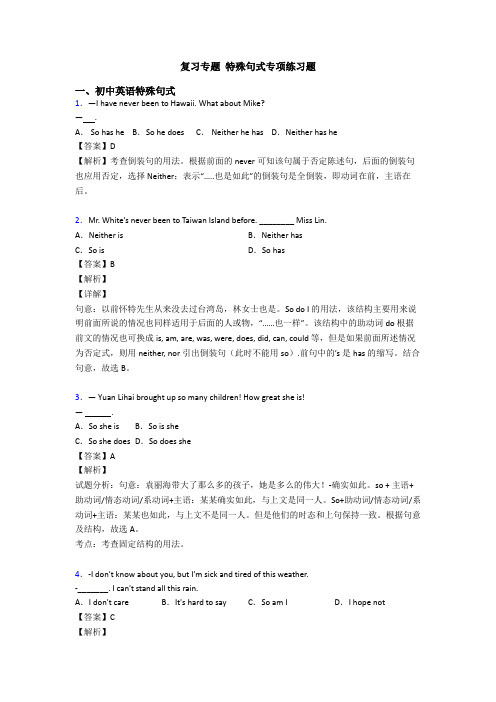
复习专题特殊句式专项练习题一、初中英语特殊句式1.—I have never been to Hawaii. What about Mike?— .A. So has he B.So he does C. Neither he has D.Neither has he【答案】D【解析】考查倒装句的用法。
根据前面的never可知该句属于否定陈述句,后面的倒装句也应用否定,选择Neither;表示“…..也是如此”的倒装句是全倒装,即动词在前,主语在后。
2.M r. White’s never been to Taiwan Island before. ________ Miss Lin.A.Neither is B.Neither hasC.So is D.So has【答案】B【解析】【详解】句意:以前怀特先生从来没去过台湾岛,林女士也是。
So do I的用法,该结构主要用来说明前面所说的情况也同样适用于后面的人或物,“……也一样”。
该结构中的助动词do 根据前文的情况也可换成is, am, are, was, were, does, did, can, could 等,但是如果前面所述情况为否定式,则用neither, nor引出倒装句(此时不能用so).前句中的’s是has的缩写。
结合句意,故选B。
3.— Yuan Lihai brought up so many children! How great she is!—.A.So she is B.So is sheC.So she does D.So does she【答案】A【解析】试题分析:句意:袁丽海带大了那么多的孩子,她是多么的伟大!-确实如此。
so + 主语+助动词/情态动词/系动词+主语:某某确实如此,与上文是同一人。
So+助动词/情态动词/系动词+主语:某某也如此,与上文不是同一人。
但是他们的时态和上句保持一致。
根据句意及结构,故选A。
【英语】特殊句式经典例题

【英语】特殊句式经典例题一、初中英语特殊句式1.-- I’m doing my homework now. What about you?--_____________.A.So do I B.So am I C.So I do D.So I am.【答案】B【解析】试题分析:句意:我正在写作业,你呢?根据句意可知,这里考查的是陈述相同的肯定,需用so+助动词+主语。
此处主句用的是系动词be,故A不对。
C、D选项的意思是:我确实做了,故C、D不对。
故选B。
考点:考查倒装句。
2.一The pen writes well though it is only worth fifteen yuan.一Let me have a try. So .A.it is B.it does C.is it D.does it【答案】B【解析】句意:——那支钢笔写起来非常好,尽管它只值15元。
——让我试试吧。
的确是。
So+主语+助动词,表示“的确,确实”;so+助动词+主语,表示“也”。
根据Let me have a try.可知我尝试过后,认为对方说的对,故表示的确是,前一句的谓语writes,故此处代指这个动词用do的各种形式,主语it是第三人称单数,用助动词does,故为So it does。
故选B。
3.—Wow. It is rather hot today. —Yes. ______ yesterday.A.So it is B.So is it C.So was it D.So it was【答案】C【解析】【详解】C 本题考查倒装句用法。
句意:—哇。
今天真热。
—是的,昨天也热。
A. So it is意为真的是,是一般现在时强调句; B. So is it意为天气真的热,是一般现在时倒装句;C. So was it 意为昨天也是,是一般过去时倒装句;D. So it was意为昨天真的是热的,强调句。
根据空格后的yesterday昨天,可知用一般过去时倒装句。
考研英语特殊句式专项及答案

特殊句式专项练习及答案1.Production is going up, so is the people’s standard of living and level of consuming .句子主干:Production is going up and the people’s standard .. and level... is going up.译文:产量在增加,人们的生活标准和消费水平也是如此.2. Should you be inquired about this post , say that you are a new clerk who is ill-informed .句子主干:(You) say that you are a new clerk译文:如果有人想你咨询这个职位,你就说你是新员工,(所以)消息不是很灵通的。
3. Hardly had he received the order that he will be sent to the flooded area when he arranged everything in the office.句子主干:He had hardly received the order译文:他一收到将被派往洪涝地区的命令,就马上安排办公室的事情。
4. Were it left me to decide, I would not hesitate to choose the latter rather than the former.句子主干:I would not hesitate to choose the latter译文:如果让我来决定,我会毫不犹豫地选择后者而不是前者。
5. Foreigner as he is, he not only knows how to communicate with the local people freely, but also masters a variety of conventions and traditions here.句子主干:he not only knows ..., but also masters a variety of conventions and traditions.译文:尽管他是一名外国人,他不仅知道如何自由和当地人交流,而且掌握了这里的各种风俗和传统。
(英语)英语特殊句式题20套(带答案)及解析
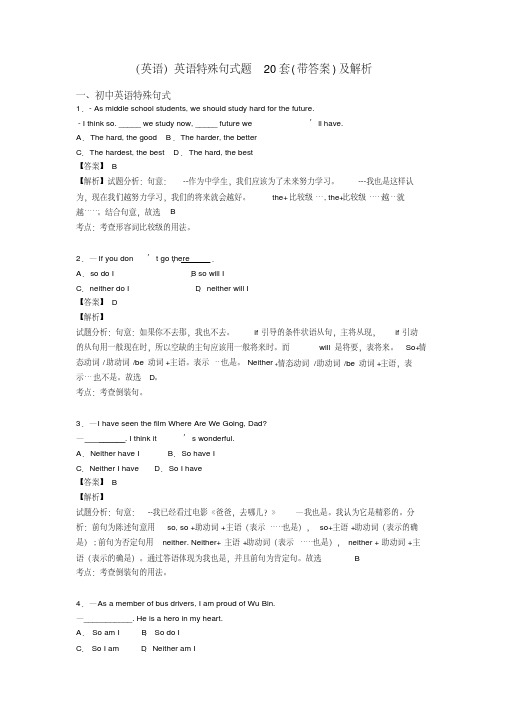
(英语)英语特殊句式题20套(带答案)及解析一、初中英语特殊句式1.- As middle school students, we should study hard for the future.- I think so. _____ we study now, _____ future we’ll have.A.The hard, the good B.The harder, the betterC.The hardest, the best D.The hard, the best【答案】B【解析】试题分析:句意:--作为中学生,我们应该为了未来努力学习。
---我也是这样认为,现在我们越努力学习,我们的将来就会越好。
the+比较级…, the+比较级……越…就越……。
结合句意,故选B考点:考查形容词比较级的用法。
,.2.—If you don’t go thereA.so do I B.so will IC.neither do I D.neither will I【答案】D【解析】试题分析:句意:如果你不去那,我也不去。
if引导的条件状语从句,主将从现,if引动的从句用一般现在时,所以空缺的主句应该用一般将来时。
而will是将要,表将来。
So+情态动词/助动词/be动词+主语。
表示…也是。
Neither+情态动词/助动词/be动词+主语,表示….也不是。
故选D。
考点:考查倒装句。
3.—I have seen the film Where Are We Going, Dad?— ______. I think it’s wonderful.A.Neither have I B.So have IC.Neither I have D.So I have【答案】B【解析】试题分析:句意:--我已经看过电影《爸爸,去哪儿?》—我也是。
我认为它是精彩的。
分析:前句为陈述句意用so, so +助动词+主语(表示……也是), so+主语+助动词(表示的确是); 前句为否定句用neither. Neither+主语+助动词(表示……也是),neither +助动词+主语(表示的确是)。
【英语】特殊句式专题(含答案)经典

【英语】特殊句式专题(含答案)经典一、初中英语特殊句式1.— Could you let me know yesterday?— Because the traffic was heavy.A. why did you come late B. why do you come lateC. why you came late D. why you come late【答案】C【解析】试题分析:句意:—你能让我知道昨天你为什么来晚了吗?—因为交通拥挤。
宾语从句用陈述句语序故排除AB;据yesterday故宾语从句用一般过去时态,故选C。
考点:考查宾语从句。
2.—David has made great progress recently. — , and .A.So he has; so you have B.So he has; so have youC.So has he; so have you D.So has he; so you have【答案】B【解析】句意:——戴维最近取得了巨大进步。
——他的确是,你也是。
根据上一句是肯定句,用so+助动词/系动词/情态动词+另外的主语,意思是:---也是,so+主语+助动词/系动词/情态动词,意思是:---的确是,根据句意故选B3.—I don’t like rainy or windy weather. What about you?—__________. I can’t do any outdoor activities.A.Me too B.So do I C.Neither do I D.Nor I do【答案】C【解析】【详解】句意:——我不喜欢下雨或刮风的日子。
你怎么样?——我也不喜欢。
我不能做任何户外活动。
A. Me too我也是;B. So do I我也是;C. Neither do I我也不是;D. Nor I do我也不是。
英语八大特殊句式

英语八大特殊句式英语八大特殊句式一、主句+not…until…句型not…until…句型是一个倒装句,意思是“直到……才……”,not是部分否定,表示强调。
例句:I didn't go home until midnight.直到半夜我才回家。
二、It+be+形容词+that…句型此句型是强调句型,能形象准确表达出句子的意思,使句子语气更加强烈。
例句:It was amazing that he finished the work in such a short time.令人惊讶的是他竟然用如此短的时间就完成了这项工作。
三、not…until+从句句型not…until+从句句型表示内容得以实现的时间,或是强调情况发生的先后,通常译为“直到……才……”。
例句:I didn't know the news until he told me.直到他告诉我我才知道这个消息。
四、No…without+名词/代词句型No…without…句型表示肯定的含义,意思是“没有……就没有……”,常用在客观事实上。
例句:No success without hard work.没有努力就没有成功。
五、little+比较级/最高级+than句型此句型在主句中有肯定含义,常用在客观事实上,表示“……比……稍微……”。
例句:I'm a little younger than he is.我比他稍微年轻一点。
六、It+be+形容词+of+sb.+to do sth.句型此句型是结构严谨、表达精准的句型,将句子的客观内容与主观评价紧密连接在一起。
例句:It was very kind of you to help me.你帮助我真的很好。
七、it+be+宾语+that从句句型此句型可以表达出主句的肯定和客观,把主句和从句有机地结合在一起,而从句又可以表达句子的主观意见。
例句:It is important that we protect the environment.我们保护环境很重要。
【英语】英语特殊句式练习题含答案

【英语】英语特殊句式练习题含答案一、初中英语特殊句式1.― Millie seldom watches action films. She finds them too noisy.― ________. Such films are always full of violence(暴力).A.Neither do I B.Neither I do C.So do I D.So I do【答案】A【解析】【详解】句意:——米莉很少看动作片。
她觉得它们太吵了。
——我也不喜欢。
这样的电影总是充满了暴力。
考查倒装句。
英语中,当前面所说的情况也适合于后者时,用“so / neither / nor+助动词+主语”这样的倒装句式,可排除BD两项。
seldom很少,表否定;根据句意语境,可知是否定意义,需用neither构成倒装句,故选A。
【点睛】部分倒装,即将主语与助动词倒置,其结构与一般疑问句大致相同。
英语中构成部分倒装的主要情形有:1. 含否定意义的词(如 never, hardly, seldom, little, few, not until, not, not only, no sooner, no longer, nowhere, by no means 等)置于句首时,其后用部分倒装。
2. only 加状语(副词 / 介词短语 / 从句)放在句首时,其后用部分倒装。
3. so / neither / nor 表示前面所说的情况也适合于后者时,用“so / neither / nor+助动词+主语”这样的倒装句式。
2.—As a member of bus drivers, I am proud of Wu Bin.—___________. He is a hero in my heart.A. So am I B. So do IC. So I am D.Neither am I【答案】A【解析】试题分析:句意:—作为公交司机的一员,我为吴斌感到骄傲。
(英语)英语特殊句式练习题含答案
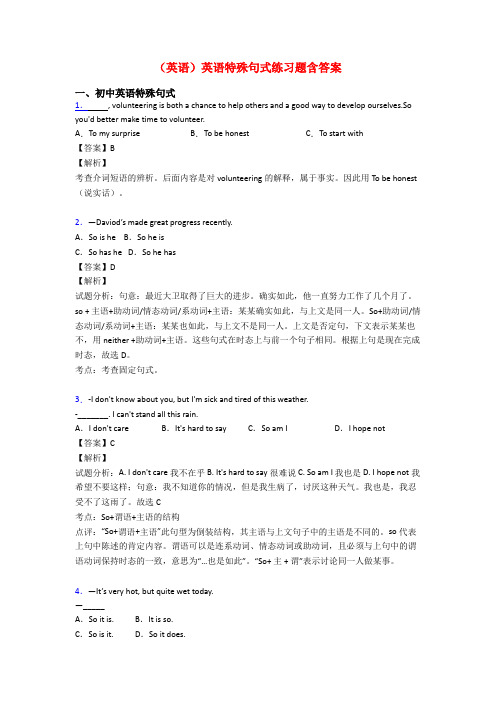
(英语)英语特殊句式练习题含答案一、初中英语特殊句式1. , volunteering is both a chance to help others and a good way to develop ourselves.So you'd better make time to volunteer.A.To my surprise B.To be honest C.To start with【答案】B【解析】考查介词短语的辨析。
后面内容是对volunteering的解释,属于事实。
因此用To be honest (说实话)。
2.—Daviod’s made great progress recently.A.So is he B.So he isC.So has he D.So he has【答案】D【解析】试题分析:句意:最近大卫取得了巨大的进步。
确实如此,他一直努力工作了几个月了。
so + 主语+助动词/情态动词/系动词+主语:某某确实如此,与上文是同一人。
So+助动词/情态动词/系动词+主语:某某也如此,与上文不是同一人。
上文是否定句,下文表示某某也不,用 neither +助动词+主语。
这些句式在时态上与前一个句子相同。
根据上句是现在完成时态,故选D。
考点:考查固定句式。
3.-I don't know about you, but I'm sick and tired of this weather.-_______. I can't stand all this rain.A.I don't care B.It's hard to say C.So am I D.I hope not【答案】C【解析】试题分析:A. I don't care 我不在乎 B. It's hard to say很难说 C. So am I 我也是 D. I hope not我希望不要这样;句意:我不知道你的情况,但是我生病了,讨厌这种天气。
- 1、下载文档前请自行甄别文档内容的完整性,平台不提供额外的编辑、内容补充、找答案等附加服务。
- 2、"仅部分预览"的文档,不可在线预览部分如存在完整性等问题,可反馈申请退款(可完整预览的文档不适用该条件!)。
- 3、如文档侵犯您的权益,请联系客服反馈,我们会尽快为您处理(人工客服工作时间:9:00-18:30)。
—All right.
A.Don’t try to B.Try not to
C.Try to not D.Don’t try
【答案】B
【解析】
试题分析:句意:---这个会议在下午3点开始,不要迟到。--好吧。本题考查祈使句的否定形式Don’t+动词的原型。根据题意可知故选B
【答案】C
【解析】句意:--那个家伙在讲什么语言?我听不懂。--我也听不懂,他来自印度,所以我猜想那是印度语。So+情态动词或助动词或be动词+主语,用于上句是肯定句,表示另一个人也同样做了这样的事情。因为上句是否定句,表示另一个人也不能怎样用neither;不能用so I can’t,故排除B;neither也不,放在句首,句子应该用倒装,故选项D是错误的;故选C。
考点:考查疑问词及固定短语的用法。
13.– I hear Yang Yan made an English speech at the graduation ceremony yesterday.- ______, and _______.
A.So she did; so did I B.So did she; so I did
考点:考查祈使句的用法
10.––David has made much progress in Chinese this year.
––____. He has reached a level which is quite good.
A.So he has B.So is he
C.So has he D.So he is
考点:考查固定句型。
14.If you want to go to the mountains this evening, so ______ I.
A.do B.will C.am
【答案】B
【解析】
试题分析:句意:如果你今天晚上想去山上,我也去. so, neither位于分句或句子的开头,这种结构通常表示前面所说的情况也适合于另一个人(或事物),表示“我也这样”之类的概念。其句型可归纳为:so / neither + be / have /助动词/情态动词+主语。so, neither开头的倒装句一定要与上句的时态保持一致。so, neither开头的倒装句中的助动词或情态动词要根据人称的变化而变换。所以选B。
考点:考查简略句。
12.Jane is going to get married ?
A.Who do you thinkB.Do you think who
C.To whom do you thinkD.Does who you think
【答案】C
【解析】
试题分析:句意:你认为简要和谁结婚?get married to sb,和某人结婚;do you think,经常作为插入语放在疑问词后。结合句意,故选C。
考点:考查倒装句的用法。
8.—I'd like to go camping with you, but I have meeting _______.
—If you don't go, ______.
A.to attend, so do I B.attending, so will I
C.attend, neither will I D.to attend, nor will I
考点:考查倒装句。
17.—Where's your brother?
—Oh, he ________ the library and ________.
A.has been to; so Lucy isB.has gone to; so Lucy has
C.has gone to; so has LucyD.has been in; so has Lucy
7.---I don’t like action films. They are too noisy.
--- ________. I never watch action films.
A.Neither do I B.Neither I do
C.So do I D.So I do
【答案】A
【解析】
试题分析:句意:我不喜欢动作电影,它们太吵了。我也不喜欢,我从不看动作电影。Neither+助动词/be动词/情态动词+主语,表示“也不……”,而Neither+助动词/be动词/情态动词+主语,表示“也……”,结合语境故选A。
考点:考查倒装句。
15.—Sorry sir, I've made so many mistakes in this paper.
—It's OK. _______. This paper is very difficult.
A.So have other students
B.So do other students
A.So do I B.So am I
C.Neither do I D.Neither am I
【答案】A
【解析】
试题分析:句意:-我有一个ipad,我很好地利用它。so do I的意思是:我也这么做了。表示前面所说的情况同样适用于后面的人或物。助动词do也可以换成be动词,could,can,does,did等等。结构:so+V+I/she/he/we/they。Neither用于对否定情况的也适用,本题是肯定的情况,故用so;原句中的动词是have,所以V应是do。所以选A。
点睛:so/neither/nor表示前面所说的情况也适合于后者,其倒装结构为“so/neither/nor+助动词/系动词/情态动词+主语”(so表示肯定意义,neither/nor“也不”表示否定意义)。如:She has finished her homework,so has her brother.She hasn’t gone there,neither/nor has he.但如果so表示强调,即强调前面所说的情况的真实性时,其结构是“so+主语+助动词/系动词/情态动词”,这里的主语同前一个句子的主语指的是同一人或物。如:She knows little English,so she does.她英语懂得不多。她的确如此。
【答案】C
【解析】
句意:---你哥哥在哪里?-----哦,他去图书馆了,露西也去了。1.have been to sp.表示去过某地,主语在说话人的地方,指从某个地方回来了,通常可与表示次数的状语连用;have gone to sp.表示到某地去了,没有回来,强调说话的当时去某地的人不在场,可能在去某个地方的路上,在去的那个地方,或回来的路上;have been in sp.意思是一直呆在某个地方。根据上文“Where's your brother?(你哥哥在哪里?)”结合语境可知“去图书馆”没有回来了,可知用has gone to sp.;2.so + be动词/助动词/情态动词+另一主语,此句型中需将主谓语倒装,表示前句所述的肯定情况也适用于另外一个人或物,例如,He is an English teacher. So am I.他是英语教师.我也是英语教师。so+主语+be动词/助动词/情态动词,此句型的主语与前一句的主语通常是指同一个“人或“物,.主谓语不需要倒装,这种句型表示说话者赞同前句所提到的情况或事实,例如,----He will go to England for his holiday tomorrow.他明天要去英国度假. ----So he will.的确如此。本句意思是露西也已经去了,故用So has Lucy;选C。
(英语)英语特殊句式专项
一、初中英语特殊句式
1.-What language is that guy speaking?I can't catch a word.
-______.He's from India,so I guess it is Hindi.
A.so can I B.so I can’t C.neither can I D.neither I can
C.So she was; so I was D.So was she; so I was
【答案】A
【解析】试题分析:句意为:---我听说昨天杨艳在毕业典礼上做了英语演讲。---的确如此。我也做了。“so+be动词(助动词、情态动词)+主语”表示前面所叙述的事实也适合于另一个人,“也”之意。“so+主语+be动词(助动词、情态动词)”表示肯定前面所叙述的是事实,“确实如此”之意。根据语境可知应选A。
【解析】试题分析:“so+助动词(情态动词或连系动词)+另一主语”,此句型是主谓倒装结构,可以表示前面的情况也适用于后者,使用该句型需要注意以几个方面的问题:1.该句型只能用于肯定句,不能用于否定句:如果前句是否定句,则要用“neither/nor+助动词+主语”。2.句型中的主语与上文中的主语是不同的两个主语3.句型中助动词,包括连系动词和情态动词的时态要和上句中谓语动词的时态相一致。句意:我从来没有去过夏威夷。麦克呢?结合语境可知上文情况同样适用于后者,故用主谓倒装结构,上文never表示否定语气,下文用neither,故选D。
考点:考查副词的用法。
5.—I hope the summer vacation will come soon.
—_______.It’s really relaxing.
A.So I did B.So I do C.So did I D.So do I
【答案】D
【解析】考查点:so引导的倒装句。解题思路:根据答句中“它真的非常轻松”可判定答语表示“我也希望”,后者与前者的所表示的内容一样时,用倒装句so+助动词+主语,且本句的时态是一般现在时态,故选D。
